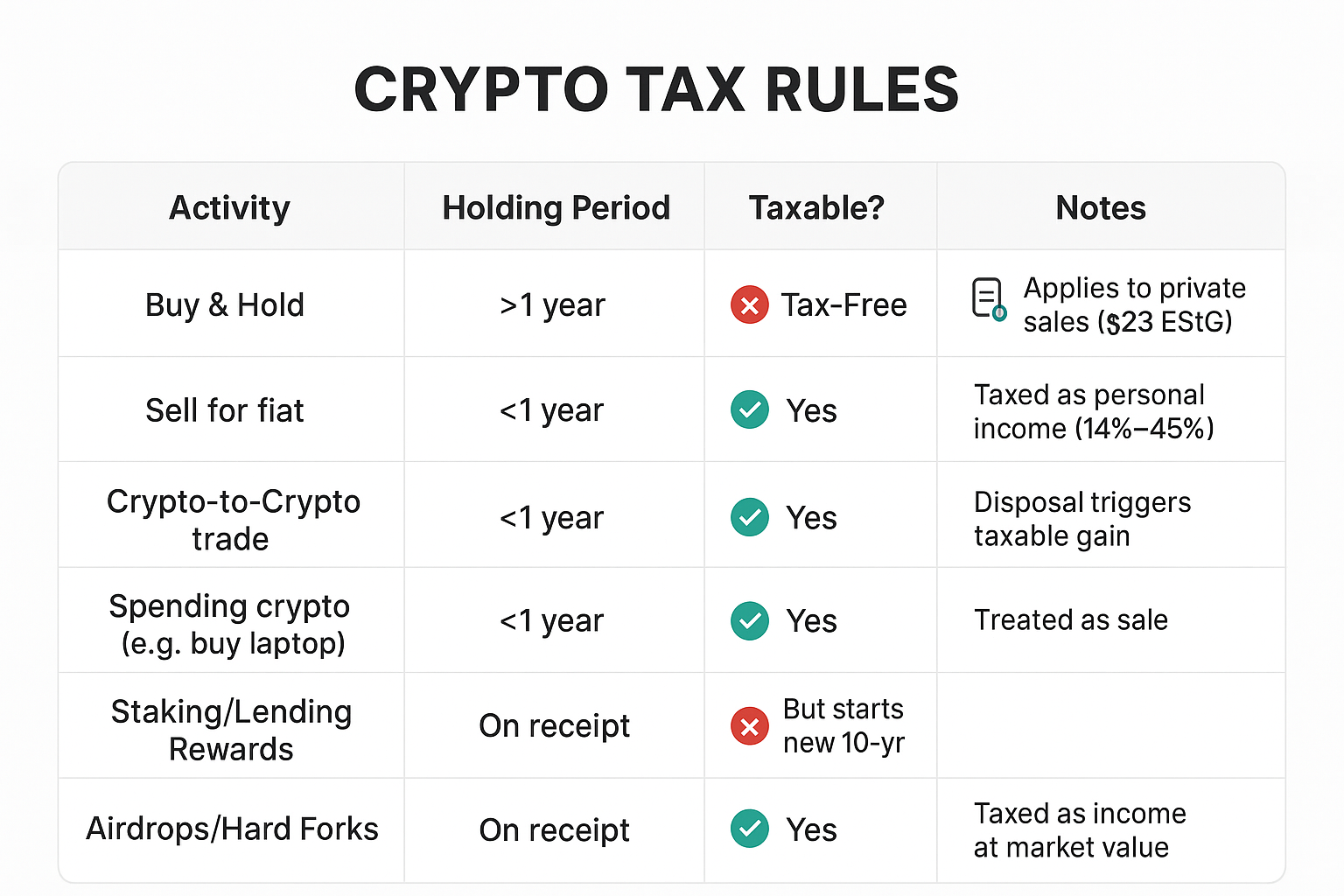The Golden Rule: Hold Period
The first, and perhaps the most important thing, worth noting is that under German legislation, cryptocurrency gains have to be paid on as income or capital gains. However, Germany has an exemption guideline that should become your new best friend and the cornerstone of your crypto debts planning in Germany.
The tax-free guideline is straightforward but powerful:
Any profit on the sale of cryptocurrencies is 100% liability-exempt if you keep crypto assets for a year or more. Let that sink in for a minute. You can purchase one Bitcoin, hold onto it for 366 days, and sell it for a profit of €20,000. You get to keep all the profit of €20,000 tax-free.
All the cryptos that qualify as part of "private assets" (Privatvermögen), i.e., almost all individual holdings and trading you can sell privately, qualify for this exemption.
Why is this so great? This guideline is good news for you because it rewards long-term holding and distinguishes crypto from other speculative assets that typically have alternative holding periods. It encourages patience and foresight over mad day-trading.
When the Clock Resets: Navigating the 10-Year Rule for Staking & Lending

While cryptocurrencies and assets are simple to purchase and own, what about generating yield from them? What rules apply to that?
That is where Germany's second significant virtual coins obligation rule kicks in: the 10-year holding period for "lending" and "similar payments."
The fiscal office (called Finanzamt) treats income from the following activities as "other income" (sonstige Einkünfte), and thus subjects them to this special rule:
- Staking rewards
- Lending interest (e.g., on such platforms as 8lends etc.)
- DeFi yield farming rewards
However, the following guidelines apply:
- The reward itself does not have to be paid on upon receipt: When you get staking rewards or interest on borrowings, debt on the yields does not arise immediately. You do not pay the state when you receive the value of the crypto.
- But this starts a new clock: The reward coins you receive are a new asset. As soon as you receive them, there is a new 10-year holding period for these coins.
- Sell before 10 years: If you trade, sell, or expend these reward coins before the 10-year period expires, the whole gain from their sale is taxable. The tax office considers their cost basis as €0, and hence regards their wholesale value as profit.
- Sale after 10 years: When you retain them for more than 10 years, their eventual sale gain is liberated from obligation for state payment.
Scenarios
On 1 January 2024, suppose, you received 0.5 ETH as a staking reward, which was worth € 1,000 back then.
- Scenario A (2026): You sell that 0.5 ETH in 2026 for €2,000, and you have a taxable gain of €2,000 (selling price – cost basis of €0).
- Scenario B (2035): You keep until 1 January 2015 and sell for €5,000. The entire €5,000 is a gain you don’t have to pay on.
This regulation makes planning strategic. It's usually a better idea to hold rewards for the long haul to avoid generating an event requiring you to pay.
Understanding these tax timelines is one thing — building a clear, compliant system around them is another. That’s where 8lends comes in. With years of experience helping financial institutions and enterprises simplify governance, risk, and compliance (GRC) processes, 8lends provides the structure needed to keep obligation to the state clean, traceable, and defensible.
From internal audit frameworks to policy management automation, 8lends ensures that your financial data always aligns with regulatory expectations — even in the evolving world of digital assets.
Taxable Events

Knowing what doesn’t trigger a tax event in Germany is just as important as knowing what does.
Here are the moments you need to monitor:
- When you sell coins you have had for less than one year for Euros, the profit has to be paid on.
- Selling Ethereum for Bitcoin evokes fiscal obligation to the state! The German budgetary department regards this as a "disposal" of your Ethereum and an "acquisition" of Bitcoin. You will have to work out the gain in Euros from the disposal if you possess Bitcoin for less than one year and then report it.
Here is an example: let’s say you buy 0.1 BTC for €3,000 and sell it for 4 ETH six months later, when 0.1 BTC is worth €5,000. You have a tax liability of €2,000.
- If you spend Bitcoin on a computer, use it to pay for a service, or spend it to purchase an NFT, you're giving up the crypto, and if its value increased since you bought it (and you held it for <1 year), you owe money on the gain.
- The fiscal office treats airdrops and hard forks as income at their market value on the date of their transference to you. That income will bring about government obligation at your personal income bracket (Einkommensteuer), up to 45%, irrespective of the provisions regarding capital gains.

Tax-Free Allowances: The €600 Sparer-Pauschbetrag
Every German taxpayer enjoys a yearly exemption on capital gains called the Sparer-Pauschbetrag. This year, it's €1,000 for singles and €2,000 for joint filers.
That means if the total profits of all types you have to pay on (including crypto, shares, and investments) in a year are less than €1,000, you pay nothing. If your profits are €2,000, you only pay on €1,000 of them (€2,000 profit - €1,000 exemption = €1,000 amount subject to state payment).
The key thing worth noting here is that this is a limit, not a cut. You can't use it to offset losses in other groups against your crypto gains; it only applies to the end figure of your capital gains.
Now that you have a richer understanding of Germany’s crypto state debt landscape, let’s focus on a few things you can do to keep your gains and stay compliant with Germany’s rules.
Your Action Plan: How to Stay Sane and Compliant

Here's your step-by-step compliance guide as a German crypto trader:
Log every single transaction
Recording all your transactions should be a strict requirement. For every trade, exchange, buy, or reward, you need to record the following core things:
- Date and time
- Transaction type (i.e., Buy, Sell, Trade, Stake Reward)
- Amount in crypto
- The value during the transaction in Euros (the purchase or sale price)
- Fees paid
Use a Software
Blockchain tools connect to your exchange APIs and wallets, download all your transactions directly, calculate your gains and losses in Euros, and, most importantly, give you a German-specific report (Steuerreport) that you can show directly to your advisor or use to fill out your Anlage SO (the capital gains form).
Divide Your Long-Term and Short-Term Crypto Positions
Determine which coins are in the "under one year" group and which are in the "tax-free" group to ensure your selling plan accounts for government obligation.
Wrapping Up
German cryptocurrency tax law isn’t complex if you understand the set of principles we’ve discussed. The system encourages long-term faith in the asset class while also ensuring everyone pays fair on short-term speculation. By embracing the one-year rule, paying attention to the 10-year reward clock, diligently recording your transactions, and utilizing today's software tools, you can make filing your reports a non-threatening year-end task.
The goal is to empower you to invest with assurance, knowing that your innovative financial moves are compliant with Germany’s robust fiscal framework and laws. With the guidelines you’ve learned from this guide, you can invest wisely while letting Germany’s fiscal regime work in your favor.
Staying compliant with Germany’s crypto tax laws doesn’t have to feel like walking a tightrope. With 8lends, you gain tools that bring clarity, documentation, and control to every transaction – so compliance becomes a natural part of your financial process, not a last-minute panic.








